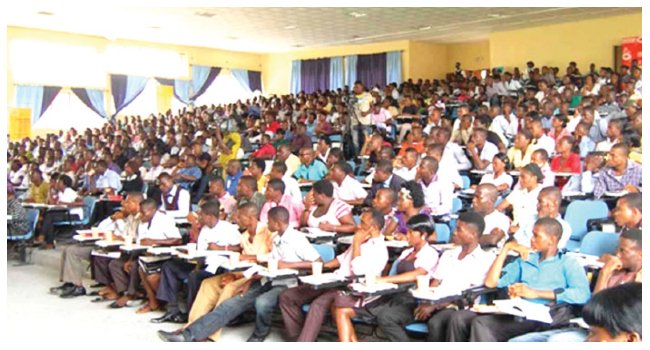In a striking show of early engagement, over 11,000 students across Nigeria have uploaded their academic project papers to the newly launched portal of the Nigeria Education Repository and Databank (NERD) within just three weeks of its rollout.
The scheme, an initiative by the Federal Ministry of Education (FME) and supported by the federal government, mandates that students – particularly those completing final-year projects or theses – submit their academic work into the centralised database before proceeding further in their academic or service journey.
For many tertiary institutions, this has meant an urgent scramble to adapt to digital submission workflows. But the volume suggests the message has already taken hold among students and institutions alike.

Table of Contents
What’s Behind the Upload Surge & Institutional Take-Up
The mandate triggering the surge is clear: beginning 6 October 2025, eligibility for mobilisation into the National Youth Service Corps (NYSC) will depend on proof of compliance with the NERD submission requirement.
According to the latest figures released by NERD, over 40,000 students have enrolled into the system while more than 11,000 project entries have been made from 242 active institutions.
The breakdown of submissions shows strong interest in science and innovation disciplines (5,952 entries), followed by multidisciplinary themes (2,091), engineering & technology (1,958), tourism & entertainment (1,392), infrastructure & sustainable development (952) and humanities (783).
One institution, Ekiti State University in Ado-Ekiti, leads the pack with 990 curated entries, followed by Bayero University Kano (611) and Auchi Polytechnic (532).
Speaking in a recent communique, the NERD spokesperson, Haula Galadima, commented that the initiative aims to boost academic quality by ensuring a transparent record of students’ work and an honourable supervisory chain (lecturer, project supervisor, institution).
In her words: “Very few lecturers would want their names associated with poorly produced academic works,” signalling the behavioural change the body hopes the policy will induce.
For students like Adeola (names changed), a final-year student at a university in the south-west, the rush to submit was real: “I registered two days after the portal opened; uploading the project took only 20 minutes but I felt relieved knowing I’m sorted for NYSC”. It’s early personal stories like this that hint at the policy’s real-world impact.

What It Means for Nigerian Higher Education
From an institutional vantage point, the NERD initiative presents multiple inflection points. First, it signals a move toward digitisation of academic outputs: theses, dissertations, final-year research are no longer confined to shelves or internal university libraries—they live in a nation-wide repository.
Secondly, the policy links academic rigour and accountability: supervisors and departments are now publicly tied to the research output. This is expected to raise the standard of supervision, reduce shoddy work, and discourage practices like certificate fraud.
Thirdly, for students, the new rule clarifies a previously grey pathway: in order to be mobilised for NYSC (arguably a rite of passage for many Nigerian graduates), compliance with NERD is now unavoidable. That tight coupling ensures strong adoption.
On the broader front: the data now being captured holds promise for future research analytics, policy-making and innovation tracking across Nigerian higher education. Over time, the repository could become a valuable national asset—spurring collaborations, enabling visibility into trending research areas and strengthening Nigeria’s academic output.
However, for all these upsides, there are also caveats: infrastructure stress, digital divide issues (especially for students in remote or under-resourced institutions), and the urgent need for effective training and institutional buy-in to ensure the quality of submissions.

Challenges Ahead and What to Watch
While the early numbers are promising, several challenges must be addressed to sustain momentum and secure long-term success.
Digital infrastructure & access: Students from less privileged institutions or with weak internet connectivity may find the upload process cumbersome. Ensuring equitable access is essential.
Quality assurance: With thousands of submissions, NERD and institutions must guard against superficial uploads—duplicate works, low-quality or ill-supervised projects may dilute the repository’s value.
Institutional integration: For the repository to live up to its promise, universities, polytechnics and colleges must fully integrate the process into their internal workflows—supervision, monitoring, archiving—and ensure staff training.
Continuous maintenance & data security: A national database of this scale requires robust systems for data management, access controls, versioning, archiving and ensuring academic integrity.
Awareness & buy-in: Some students and staff may view the mandate as another hurdle rather than an opportunity. Building positive perceptions—emphasising the long-term benefits of visibility, research collaboration and recognition—is vital.
Going forward, stakeholders will be watching how submission rates evolve beyond the initial rush, how the quality of entries holds up, and how effectively the repository becomes a living resource. If it works well, Nigeria could set a precedent in African higher education for digitised academic output, research transparency and institutional accountability.
With over 11,000 student projects already uploaded, the NERD scheme has made a robust start. It represents a major shift in how academic outputs are handled in Nigerian tertiary education—anchored in policy, driven by technology, and supported by the compulsions of modern digital oversight. The coming months will test whether this initiative can move from a strong launch to sustained institutional change, but for now at least – the momentum is unmistakably real.
Join Our Social Media Channels:
WhatsApp: NaijaEyes
Facebook: NaijaEyes
Twitter: NaijaEyes
Instagram: NaijaEyes
TikTok: NaijaEyes
READ THE LATEST EDUCATION NEWS





